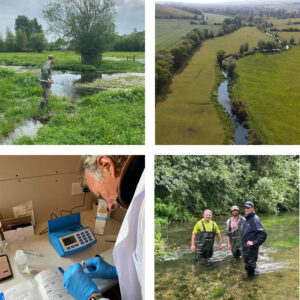The Wylye Valley Farmers are a farmer cluster group with 34 members covering over 12,000 hectares. They operate in the catchment of the River Wylye which is a nationally important chalk river and tributary of the Hampshire Avon. Robin Leech, an Ecologist working with Wylye Valley Farmers, gives us an update on a project to investigate water quality on the River Wylye…
Since May 2023 Wylye Valley Farmers have worked together to investigate the water quality of the River Wylye and look at the impact of agricultural pollution entering the water course. The group set up a small lab in a converted farm building using laboratory grade equipment, with advice from The Game and Wildlife Conservation Trust (GWCT), Wessex Rivers Trust, Catchment Sensitive Farming and Rothamstead Research.
Nitrates and Phosphate levels are being monitored in 17 locations along a 20-mile stretch of river using a photometer for analysis. This will allow the group to point source and monitor the nutrient levels in the water course to locate nutrient ‘hot spots’ and work out areas that require investigation. Scientists from the GWCT have provided the methodology and training for this technique.

The project is currently a pilot project that is being run to design the best method of water quality monitoring that can be achieved by a farmer cluster group.
This method will then be rolled out to other catchments in the Avon catchment and beyond, through the farmer collaborative The Environmental Farmers Group (EFG). The aim of the EFG is to harness farmer collaboration at scale in order to deliver environmental projects for emerging ecosystem services markets and is designing a catchment conservation plan to achieve carbon net zero farming by 2040, reverse biodiversity decline, and achieve clean water in the Hampshire Avon.
Funding for the project has been achieved with support from Farming in Protected Landscapes, Natural England, Fishmongers Livery Company, Codford Biogas and The Countryside Stewardship Facilitation Funding.
